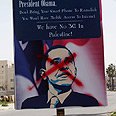
PA to Obama: Complete settlement freeze essential
US presidential visit fails to draw excitement in West Bank with Palestinians seeing little reason for optimism in Obama's second term; Erekat: Deeper, long standing effort needed
President Barack Obama will find a disillusioned Palestinian public, skeptical about his commitment to promoting Mideast peace, when he visits the region.
Obama's trip, beginning Wednesday, appears aimed primarily at resetting the sometimes troubled relationship with Israel. But winning the trust of the Palestinians, who accuse him of unfairly favoring Israel, could be a far more difficult task.
Related stories:
- Hotel drill simulates Obama rescue
- 'Israel must show Arab public it's serious about peace'
- Op-ed: Obama, don't visit Ramallah
After suffering disappointments during the first Obama administration, Palestinians see little reason for optimism in his new term. The White House announcement that Obama will not present any new peace initiatives strengthened their conviction that the US leader isn't prepared to put the pressure on Israel that they think is necessary to end four years of deadlock in negotiations.
"Obama is coming for Israel, not for us," said Mohammed Albouz, a 55-year-old Palestinian farmer.
"Obama will come and go as his predecessors did, without doing anything."
While Israel is preparing to give Obama the red-carpet treatment, there are few signs of excitement in the West Bank.
Large posters of Obama hung in Ramallah last week were quickly defaced, and a small group of activists called "The Campaign for Dignity" plans on releasing black balloons into the air in a sign of mourning when Obama arrives.
Obama himself played a role in reaching the current deadlock, which stems in large part from disagreements over Israeli settlement construction in the West Bank and east Jerusalem. The Palestinians claim both areas, captured by Israel in the 1967 Mideast war, as parts of a future state, a position that is widely backed internationally.
When Obama first took office, he strongly and publicly criticized the Israeli settlements, saying the construction undermines hopes for peace. "It is time for these settlements to stop," Obama said in a high-profile address to the Muslim world delivered in Cairo just months after taking office.
Emboldened by Obama's tough stance, the Palestinians said they would not negotiate with Israel's Prime Minister, Benjamin Netanyahu , unless settlement construction was frozen.
Obama persuaded Netanyahu to impose a 10-month slowdown, but Palestinians did not agree to restart talks until the period was nearly over. When the Israeli moratorium expired several weeks later, Netanyahu rejected American appeals to extend the slowdown, and the negotiations collapsed.
Obama stopped pushing the matter, and talks have never resumed, and the Palestinians, viewing Obama as afraid to take on Israel's allies in Washington, have few expectations now.
"What we are going to tell him behind closed doors is what we are saying in public. There is no secret that a successful peace process needs a complete settlement freeze," said Nabil Shaath, a top adviser to President Mahmoud Abbas . "The Israelis are building on our land and claiming they want to negotiate with us about this land."
Obama will get a firsthand glimpse of settlements when he heads to the Palestinian city of Ramallah on Thursday. The 20-minute drive from Jerusalem passes by sprawling settlements that are home to tens of thousands of Israelis.
Obama is scheduled to meet with Palestinian leaders and visit a youth center. He plans to head to the West Bank town of Bethlehem the next day to see the Church of the Nativity, built on the site where Christian tradition says Jesus was born.
Netanyahu, who was re-elected in January, has said he will make a renewed push for peace in his new term. His new government, which takes office this week, is sending mixed signals.
Saeb Erekat, the chief Palestinian negotiator, said getting talks back on track will require a deeper and long-standing effort by the president and his new secretary of state, John Kerry, who is expected back in the region in April.
"We really hope that President Obama and Secretary Kerry can succeed in reviving a meaningful peace process, succeed in having Netanyahu saying the sentence that he accepts the two states in the 1967 borders," Erekat said. "We don't need new plans. We need commitment."
Hani Masri, a prominent Palestinian commentator in the West Bank, said the visit might lead to some movement.
"Most likely we are going to see some life in the negotiations," perhaps a limited settlement freeze that forces Abbas to resume talks. "But such a process won't lead to a peaceful settlement."
- Receive Ynetnews updates directly to your desktop











